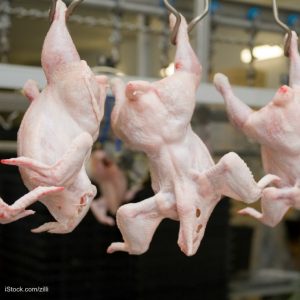Phyllis McKelvey, a former USDA poultry inspector, has started a petition on Change.org against HIMP, the USDA’s new plan to reform poultry inspection. The program, called HACCP-based Inspection Models Project, has been criticized by many organizations, including the Consumer Federation of America, the National Consumer League, and Food & Water Watch, who believe it will lower quality and standards in the poultry industry.
 McKelvey says, “I have dedicated my professional life to protecting the integrity of the nation’s food supply and I believe the USDA’s plan to decrease poultry inspection and increase line speed is bad for consumers and poultry plant workers.” The model reduces the number of USDA inspectors and also increases line speeds. Workers will have 1/3 of a second to “inspect” chickens as they fly by on the line.
McKelvey says, “I have dedicated my professional life to protecting the integrity of the nation’s food supply and I believe the USDA’s plan to decrease poultry inspection and increase line speed is bad for consumers and poultry plant workers.” The model reduces the number of USDA inspectors and also increases line speeds. Workers will have 1/3 of a second to “inspect” chickens as they fly by on the line.
The petition states that “inspectors can no longer see all parts of the bird. Under this proposal, even the best inspectors miss lesions, tumors, and fecal matter, and when they do see these things, they often are not able to stop the line. The USDA’s mission should be to protect consumers, not increase the likelihood of public sickness.”
Back in September, a coalition of groups sent a letter to the USDA to withdraw HIMP. Information on the web site Let Them Eat Chicken states that there is no provision mandating training of plant employees, who would take over jobs previously conducted by trained government inspectors. The coalition also criticizes the lack of a poultry testing standard in HIMP. The proposal lets each facility develop its own testing protocol. Finally, plants would not be forced to test for Salmonella or Campylobacter, the two bacteria most often found on poultry. Campylobacter in poultry was the number one food/pathogen combination in 2011, accounting for 60% of all foodborne illnesses.





Please don’t allow the poultry industry to speed up lines & reduce oversight. This is wrong on so many levels it’s hard to understand how it could even be considered. The people working in conditions that are marginally acceptable at best will be subject to far more injuries with little recourse available to them. It’s always more more more with less & don’t even think about complaining. The animal rights issue of humane treatment before & during slaughter, which is blatently ignored as things stand now, will become nonexistant & it’s so easily forgotten that industry, any industry wouldn’t bother having a “standard” if it wasn’t mandated in the first place. It’s well documented our food supply, especially meat, is dangerously contaminated for a number of reasons, industry practices being the biggest one. If what little oversight that is provided now is scaled back, there will be health repercussions.